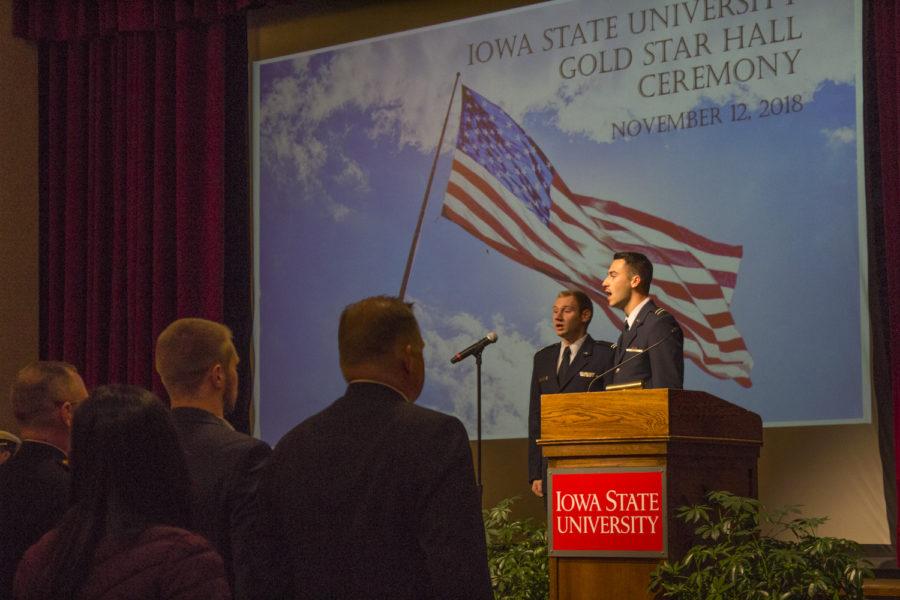Iowa State’s annual Gold Star Ceremony honors three former students
Kennedy DeRaedt/Iowa State Daily
ROTC students Jackson Koster (graduated) and senior Colin Long sing the National Anthem at the Gold Star Hall Ceremony. The Gold Star Hall Ceremony was held Nov. 12, 2018 in the Great Hall of the Memorial Union. The ceremony honored three fallen WWII service members, and celebrated the one hundred year anniversary of the end of WWI and the ninety year anniversary of the Memorial Union.
November 7, 2021
Three former Iowa State University students will be honored during Iowa State’s Gold Star Hall Ceremony for their services in World War II.
Robert Abram Berwick, Donald T. Griswold Jr. and William Conrad Ostlund are all Iowa natives and their families will be present at the ceremony to talk about their lives as servicemen.
The ceremony will also include taped comments from Iowa State University President Wendy Wintersteen, a presentation of the colors by members of Iowa State ROTC, singing of the National Anthem and memorabilia and medals from the fallen soldiers.
Brad Hill, associate director of the Memorial Union and chair of the Gold Star Hall committee, said the committee was formed to honor past servicemen, as well as those still serving today.
“The Gold Star Ceremony was developed as a way to celebrate the lives of those Iowa Staters whose names have been enshrined in Gold Star Hall for making the ultimate sacrifice in service to our country,” Hill said. “The ceremony is held during Veteran’s Day week as a way to honor those that have passed and to bring notice to those still in service to our country.”
The event has happened annually since 2003. Each year, the committee searches for the lives of three to five honorees and works with their families to set up a memory table.
Donald T. Griswold Jr. grew up on a farm while attending Clarinda High School. He participated in 4-H vocational agriculture clubs and was a skilled athlete, running track and playing football.
Griswold started classes at Iowa State in 1936, majoring in agronomy. He was a member of the local chapters of the American Society of Agronomy and the Society for Advancement of Management. He received three varsity letters for the Cyclone football team after helping them to a 10-game winning streak during his sophomore year.
After graduating in 1941, Griswold enlisted in the U.S. Navy Reserve as an air corps cadet. He initially reported to Kansas, but due to his previous flight training in Ames, he was quickly transferred to Pensacola, Fla. He was eventually assigned to the USS Hornet.
On June 6, 1942, Griswold’s plane had suffered crippling damage, but he did not retreat. Instead, he dove down to drop a bomb on the lead Japanese cruiser Mukima. He was unable to pull the plane out due to the damage and crashed into the ocean.
For his sacrifice, he was posthumously awarded the Purple Heart and the Distinguished Flying Cross.
Paul Griswold is Donald’s nephew. While he never met him, Paul said this event would mean a lot to him.
“Don would be honored that his sacrifice was worth it,” Paul said. “In the face of tremendous enemy machine gun fire, aimed directly at him, he stayed on target and delivered his 500 pound bomb. He was presumably dead, or near death already, but he held on long enough to accomplish his mission.”
Robert Abram Berwick grew up in Knoxville, Tenn. In 1932 his family moved to the north-central area of Des Moines. He graduated third in his class from East High School and was the president of his senior class.
Berwick began his pre-medical program majoring in chemistry at Iowa State University while serving as the secretary of the Pre-Medics Society. With one year remaining at Iowa State, Berwick enlisted in the U.S. Navy.
In the summer of 1944, he graduated from Harvard Naval Training School and was assigned to the Pacific Fleet. He shipped out in August 1944, joining the Allies’ “island hopping” campaign.
After a 30-day leave in January 1945, he returned to duty aboard the USS Kidd, a destroyer that joined Task Force 58 in preparation for the invasion of Okinawa.
On April 11, 1945, a Japanese aircraft crashed into the ship’s boiler room, catapulting a bomb through the ship that exploded and killed 38 men, including Berwick.
Berwick was posthumously awarded the Purple Heart.
William Ostlund grew up in Webster City. He came to Iowa State in 1936 to study agricultural business and earned a spot on the Cyclone basketball team. Ostlund eventually transferred and graduated from Butler University in Indianapolis.
After college, Ostlund enlisted in the U.S. Naval Reserve. After completing submarine training in New London, Conn., he was assigned to the USS Gudgeon.
In the midst of his second patrol, the ship disappeared. After two months of radio silence, the ship and its crew of 81 men were declared overdue and presumed lost June 7, 1944.
Beth Ostlund is William’s niece. She is not able to attend the ceremony, but she wanted to provide some insight into his life.
“My father said Bill always had a crowd of kids following him around idolizing him,” Beth said. “He was known as a kind, thoughtful, humble and hard-working young man. He was an accomplished scholar, an athlete who excelled and a young man who was supported by his widowed mother and two younger brothers.”
Beth talked about the importance of the Gold Star Ceremony and how impactful it is to her family.
“This ceremony is a deeply moving and meaningful event,” she said. “I know that Uncle Bill, were he able to attend in person, would be honored. However, I have no doubt he will be there, one way or another.”
The Gold Star Hall Ceremony will take place at 3:15 p.m., Monday, in Durham Great Hall. The entire campus and surrounding communities are invited to attend the ceremony.







